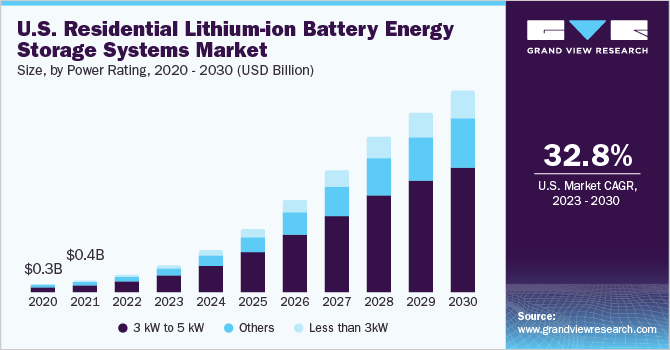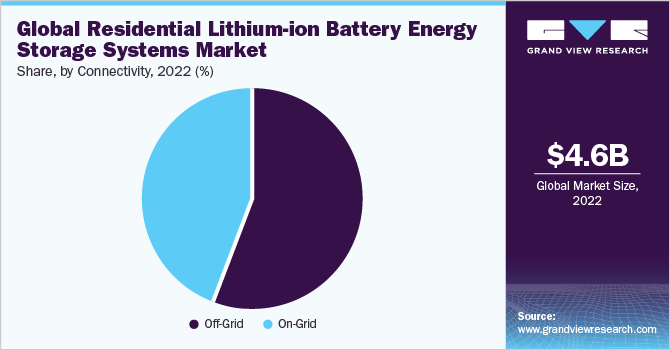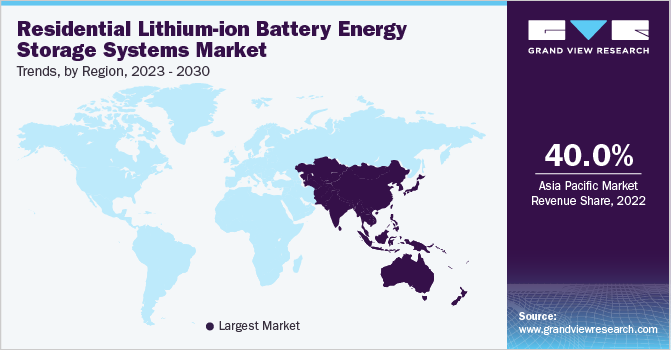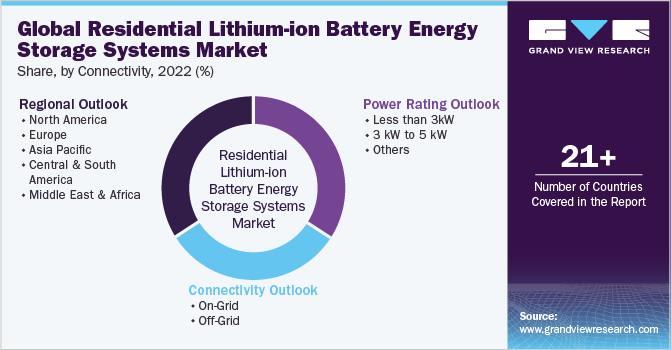- Home
- »
- Power Generation & Storage
- »
-
Residential Lithium-ion Battery Energy Storage Systems Market ReportGVR Report cover
![Residential Lithium-ion Battery Energy Storage Systems Market Size, Share & Trends Report]()
Residential Lithium-ion Battery Energy Storage Systems Market Size, Share & Trends Analysis Report By Power Rating (Under 3kW, 3kW - 5kW), By Connectivity (On-Grid, Off-Grid), By Region, And Segment Forecasts, 2023 - 2030
- Report ID: GVR-4-68040-059-7
- Number of Report Pages: 110
- Format: PDF, Horizon Databook
- Historical Range: 2018 - 2021
- Forecast Period: 2023 - 2030
- Industry: Energy & Power
Report Overview
The global residential lithium-ion battery energy storage systems market size was valued at USD 4.56 billion in 2022 and is expected to grow at a compound annual growth rate (CAGR) of 32.1% from 2023 to 2030. The lithium-ion battery energy storage systems in the market are designed to store excess energy produced by residential solar panels and other renewable energy sources. As renewable energy poses new challenges such as the abrupt supply of energy in harsh weather; energy storage remains key for the transition toward clean energy goals. Furthermore, lithium-ion energy systems enable the storage of large volumes of energy to meet energy demands at their peak and its usage when adverse conditions such as lack of sunlight surface.

The residential energy storage industry has been growing rapidly in recent years, due to the increasing adoption of solar panels and other renewable energy sources. Lithium-ion batteries are the most commonly used type of battery in these systems, due to their high energy density, long cycle life, and low maintenance requirements.
The U.S. is one of the largest revenue-generating regions, thanks to the widespread adoption of battery energy storage in the regional market, which is largely due to the rising demand for renewable energy in the country. The market in the country is projected to grow at a significant CAGR over the forecast period. Factors such as positive government initiatives and increasing efficiency of residential battery energy storage analysis are expected to increase the market for residential lithium-ion battery storage systems over the forecast period.
For instance, the Inflation Reduction Act of 2022 introduced a tax credit for the installation of solar PV panels as well as battery energy storage systems for residential and commercial industries. The government offered a tax credit worth 30% of the installation cost of the systems. This is expected to incentivize homeowners to install battery storage systems along with solar PV installation driving demand in the market.
Many market players are looking to increase their market presence and expand their production capabilities to keep up with the growing demand in the market. For instance, in January 2023, LG Energy Solution and Hanwha Group announced that they will jointly invest in battery production facilities in the United States. The investment will be done to increase the respective company’s market share in the U.S. battery energy storage systems industry.
Power Rating Insights
The 3 kW to 5 kW segment dominated the global residential lithium-ion battery energy storage systems market in the power rating segment and accounted for more than 54.0% overall revenue share in 2022. Residential lithium-ion battery energy storage systems with a capacity of between 3 kW to 5 kW is capable of storing sufficient energy to power a household for several hours, even during periods of peak energy demand. This can help reduce energy bills and provide greater control to consumers over energy consumption. Another advantage of these battery storage systems is their scalability. They can be easily installed in a variety of residential settings, including residential buildings for multiple apartments to larger homes. Furthermore, these can be scaled up or down depending on the energy needs of the household. Battery energy storage systems with a capacity between 3kW to 5kW are generally more expensive owing to their higher capacity, leading to higher production and installation costs.
Connectivity Insights
The off-grid segment dominated the global residential lithium-ion battery energy storage systems market in the connectivity segment and accounted for more than 56.0% overall revenue share in 2022. The demand for residential lithium-ion battery energy storage systems for on-grid applications is on the rise as it provides homeowners with reliable access to energy even in remote locations.

These systems are designed to store excess energy generated by solar panels or wind turbines, which can then be used to power homes during periods of low energy production or when energy generation is offline. One of the key benefits of these systems is their ability to provide greater energy independence and security for homeowners living in remote areas. By storing excess energy from solar panels or wind turbines, homeowners can ensure that they have reliable access to energy at all times. These systems can be easily installed in a variety of residential settings and can be scaled up or down depending on the energy needs of the household.
Residential lithium-ion battery energy storage systems for off-grid applications offer a promising solution for homeowners who are looking for a reliable and sustainable source of energy in remote locations. Off-grid battery energy storage systems are generally slightly cheaper than on-grid solutions as they do not need to be connected to the national grid and can operate at generally lower power ratings.
Regional Insights
Asia Pacific dominated the regional segment and accounted for the overall revenue share of more than 40.0% in 2022. The market in Asia Pacific is expected to witness significant growth over the forecast period. This can be attributed to the increasing demand for clean energy and the increasing adoption of solar power systems in the residential sector.

Countries such as Japan, Australia, and South Korea lead the market growth in the region, owing to favorable government initiatives and policies promoting the adoption of renewable energy. Furthermore, decreasing the cost of lithium-ion batteries and rising awareness of energy efficiency are driving the growth of this market.
Key Companies & Market Share Insights
Established players in the market are developing new products through R&D suitable for residential lithium-ion battery energy storage systems applications. For instance, in March 2022, Evonik Industries AG announced VESTAKEEP iC4800 3DF, a new osteoconductive PEEK (polyether ether ketone) filament that improves fusion between bones and implants. Some prominent players in the global residential lithium-ion battery energy storage systems market include:
-
HAIKAI
-
Enphase Energy
-
E3/DC
-
Panasonic
-
sonnen Holding GmbH
-
Tesla
-
Pylon Technologies Co., Ltd.
-
LG Chem
-
AlphaESS
-
Generac Power Systems
-
Hitachi Energy
-
GOODWE
Residential Lithium-ion Battery Energy Storage Systems Market Report Scope
Report Attribute
Details
Market size value in 2023
USD 6.97 billion
Revenue forecast in 2030
USD 48.81 billion
Growth Rate
CAGR of 32.1% from 2023 to 2030
Base year for estimation
2022
Historical data
2018 - 2021
Forecast period
2023 - 2030
Quantitative units
Revenue in USD million, CAGR (%) from 2023 to 2030
Report coverage
Revenue forecast, company profiles, competitive landscape, growth factors, trends
Segments covered
Power rating, connectivity, region
Region scope
North America; Europe; Asia Pacific; Central & South America; Middle East & Africa
Country scope
U.S.; Canada; Mexico; Germany; UK; Italy; Spain; France; Poland; China; India; Japan; Australia; Brazil; Argentina; UAE; Saudi Arabia
Key companies profiled
HAIKAI; Enphase Energy; E3/DC; Panasonic; sonnen Holding GmbH; Tesla; Pylon Technologies Co., Ltd.; LG Chem; AlphaESS; Generac Power Systems; Hitachi Energy; GOODWE
Customization scope
Free report customization (equivalent up to 8 analysts’ working days) with purchase. Addition or alteration to country, regional, and segment scope.
Pricing and purchase options
Avail customized purchase options to meet your exact research needs. Explore purchase options
Global Residential Lithium-ion Battery Energy Storage Systems Market Report Segmentation
This report forecasts revenue growth at global, regional & country levels, and provides an analysis of the latest industry trends in each of the sub-segments from 2023 to 2030. For this study, Grand View Research has segmented the global residential lithium-ion battery energy storage systems market report based on power rating, connectivity, and region:

-
Power Rating Outlook (Revenue, USD Million, 2018 - 2030)
-
Less than 3kW
-
3 kW to 5 kW
-
Others
-
-
Connectivity Outlook (Revenue, USD Million, 2018 - 2030)
-
On-Grid
-
Off-Grid
-
-
Region Outlook (Revenue, USD Million, 2018 - 2030)
-
North America
-
U.S.
-
Canada
-
Mexico
-
-
Europe
-
Germany
-
UK
-
Italy
-
Spain
-
France
-
Poland
-
-
Asia Pacific
-
China
-
India
-
Japan
-
Australia
-
-
Central & South America
-
Brazil
-
Argentina
-
-
Middle East & Africa
-
UAE
-
Saudi Arabia
-
-
Frequently Asked Questions About This Report
b. The global residential lithium-ion battery energy storage systems market size was estimated at USD 4.56 billion in 2022 and is expected to reach USD 6.97 billion in 2023.
b. The global residential lithium-ion battery energy storage systems market is expected to grow at a compound annual growth rate of 32.1% from 2023 to 2030 to reach USD 48.81 billion by 2030.
b. Asia Pacific dominated the residential lithium-ion battery energy storage systems market with a share of 40.02% in 2012. This is attributable to the rising demand for battery storages in the countries like China and India. The developing economies of this region have been upgrading their energy infrastructure to meet the rising demand for power and taking measures to control future energy consumption by implementing regulations to promote the adoption of battery energy storage systems. .
b. Some key players operating in the residential lithium-ion battery energy storage systems market include HAIKAI, Enphase Energy, E3/DC, Panasonic, Sonnen Holding GmbH, Tesla, Pylon Technologies Co., Ltd., LG Energy Solution, AlphaESS, Generac Power Systems, Hitachi Energy, GOODWE.
b. Key factors that are driving the market growth include is the falling prices of lithium-ion batteries. As demand for lithium-ion batteries has grown, economies of scale have come into play, leading to increased production and favorable government policies promoting the growth of the market.
Share this report with your colleague or friend.
![gvr icn]()
NEED A CUSTOM REPORT?
We can customize every report - free of charge - including purchasing stand-alone sections or country-level reports, as well as offer affordable discounts for start-ups & universities. Contact us now
![Certified Icon]()
We are GDPR and CCPA compliant! Your transaction & personal information is safe and secure. For more details, please read our privacy policy.
We are committed towards customer satisfaction, and quality service.
"The quality of research they have done for us has been excellent."





